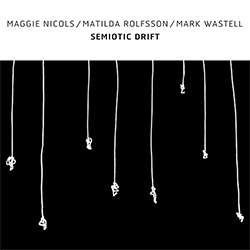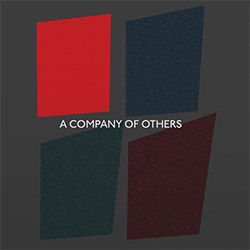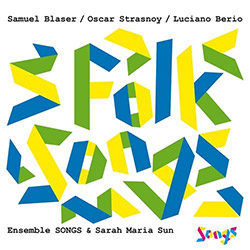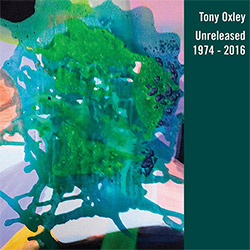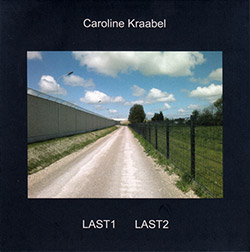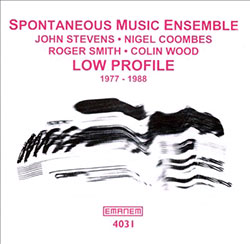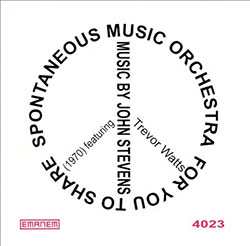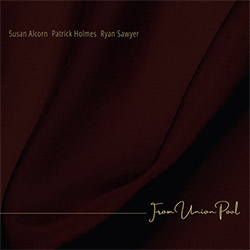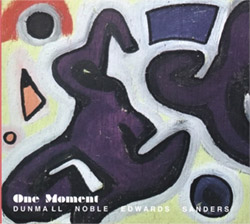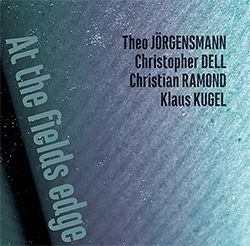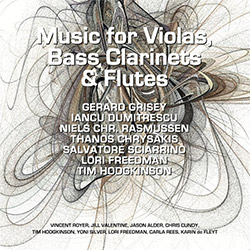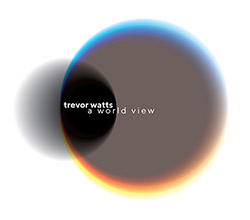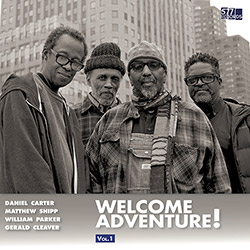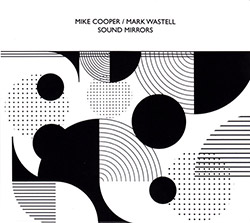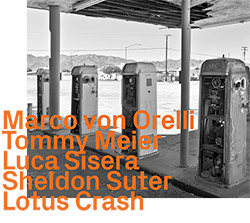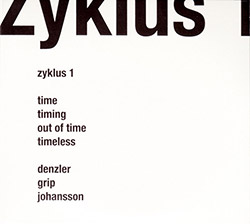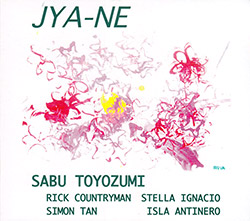![Spontaneous Music Orchestra: Search & Reflect (1973-81) [2 CDs] (Emanem) Spontaneous Music Orchestra: Search & Reflect (1973-81) [2 CDs] (Emanem)](https://www.teuthida.com/productImages/misc4/22654.jpg)
An amazing collection of concepts described in John Steven's manual "Search and Reflect" and recorded in workshops and concerts primarily in the 70s, with participants including Trevor Watts, Evan Parker, Paul Rutherfod, Ian Brighton, Nigel Coombes, John Russell, Lindsay Cooper, &c.
Save $2.30
Out of Stock
Quantity in Basket: None
Log In to use our Wish List
Shipping Weight: 4.00 units
Sample The Album:
Herman Hauge-alto saxophone
Dave Decobain-alto saxophone
Ye Min-alto saxophone
Colin Wood-cello
Jane Robertson-cello
Lindsay L. Cooper-cello
John Stevens-direction, drums, percussion, voice
Marc Meggido-doublebass
Marcio Mattos-doublebass
Ron Herman-doublebass
Angus Fraser-doublebass
Ian Brighton-electric guitar
John Russell-electric guitar
Paul Rutherford-Euphonium
Martin Mayes-French Horn
Roger Smith-guitar
Chris Turner-harmonica
Dave Panton-instruments
Dave Solomon-percussion
Howard Riley-piano
Simon Mortimer-piano
Peter Drew-piano
Larry Stabbins-saxophone
Robert Calvert-sopranino saxophone
Evan Parker-soprano saxophone
Lol Coxhill-soprano saxophone
Trevor Watts-soprano saxophone
Bob Turner-soprano saxophone
Alan Tomlinson-trombone
Jon Corbett-trumpet
Nigel Coombes-violin
Robert Carter-violin
Stephen Luscomb-violin
Brian Eley-voice
Maggie Nicols-voice
Click an artist name above to see in-stock items for that artist.
UPC: 5030243520923
Label: Emanem
Catalog ID: 5209
Squidco Product Code: 22654
Format: 2 CDs
Condition: New
Released: 2016
Country: Great Britain
Packaging: Cardboard Gatefold 3 Panels
Track 1-1 recorded at Little Theatre Club, September 28th, 1973.
Track 1-2 and 1-3 recorded at Almost Free Theatre, May 1st, 1973.
Track 1-4 recorded at ICA Theatre, July 1st, 1973.
Track 1-5 recorded at Ealing Technical College, November 23rd, 1973.
Track 2-1.1 to 2-1.3 recorded at St John's Smith Square, January 25th, 1975.
Track 2-2, 2-3 recorded at Notre Dame Hall, May 8th, 1981.
A1-5 originally issued in 2000 as Emanem 4039; B1 originally issued in 1975 as A LP 003 - reissued in 2001 on Emanem 4062; B2-3 originally issued in 1982 on SFA?LP 112 - reissued in 2008 on Emanem 4150
Biography for: Lindsay L. Cooper
"Lindsay L. Cooper (18 January 1940 - 19 June 2001) was a Scottish double bass, electric bass and cello player. He spent four years working as a ship's musician and had performed and recorded with a number of other musicians and bands, including Michael Jackson, Boy George, Derek Bailey and Mike Oldfield.
A native of Glasgow, Cooper moved to London in 1965 where he became a professional musician. From 1965 to 1967 and again in 1970, he worked as a ship's musician on the Queen Mary and P&O passenger liner ships. In 1972 and 1973, Cooper studied music with British double bassist and teacher Peter Ind. In 1978 he moved to Zürich, but returned to Scotland in 1990 where he ran a free improvisation workshop in Edinburgh.
Among the musicians with whom Cooper performed and recorded were Evan Parker, Keith Tippett, Kenny Wheeler, Ken Colyer, Bobby Bradford and Lol Coxhill. He also recorded with Strawbs, the Bill Wells Octet and a number of other jazz, rock and folk groups. His main musical influences included Thelonious Monk, King Oliver and Derek Bailey.
Lindsay L. Cooper died in Edinburgh at the age of 61."
-Wikipedia (https://en.wikipedia.org/wiki/Lindsay_L._Cooper)Biography for: John Stevens
"John William Stevens (10 June 1940 in Brentford, Middlesex - 13 September 1994 in Ealing, west London) was an English drummer. He was one of the most significant figures in early free improvisation, and a founding member of the Spontaneous Music Ensemble (SME).
Stevens was born in Brentford, the son of a tap dancer. He used to listen to jazz as a child, but was initially more interested in drawing and painting (media through which he also expressed himself throughout his life). He studied at the Ealing Art College and then started work in a design studio, but left at 19 to join the Royal Air Force. He studied the drums at the Royal Air Force School of Music in Uxbridge, and while there met Trevor Watts and Paul Rutherford, two musicians who became close collaborators.
In the mid-1960s Stevens began to play in London jazz groups alongside musicians like Tubby Hayes and Ronnie Scott, and in 1965 he fronted a septet. Influenced by the free jazz he was hearing coming out of the United States by players like Ornette Coleman and Albert Ayler, his style began to move away from fairly traditional be-bop to something more experimental.
In 1966 SME was formed with Watts and Rutherford and the group moved into the Little Theatre Club at Garrick Yard, St. Martin's Lane, London to develop their new music. In 1967 their first album, Challenge, was released. Stevens then became interested in the music of Anton Webern, and the SME began to play generally very quiet music. Stevens also became interested in non-Western musics.
The SME went on to make a large number of records with an ever changing line-up and an ever changing number of members, but Stevens was always there, at the centre of the group's activity. He also played in a number of other groups, drumming in Watts' group Amalgam and later forming bands like Freebop and Fast Colour, for example, but the SME remained at the centre of his activities.
In the latter part of 1967 Evan Parker joined the SME and worked closely with Stevens in the group, eventually becoming one of the longest standing members. He later summed up Stevens' approach to improvising in two basic maxims: if you can't hear another musician, then you're too loud; and there is no point in group improvisation if what you are playing doesn't relate to what other members of the group are playing.
Stevens also devised a number of basic starting points for improvisation. These were not "compositions" as such, but rather a means of getting improvisational activity started, which could then go off in any direction. One of these was the so-called "Click Piece" which essentially asked for each player to repeatedly play a note as short as possible.
Stevens played alongside a large number of prominent free improvisors in the SME, including Derek Bailey, Peter Kowald, Julie Tippetts and Robert Calvert, but from the mid-1970s, the make-up of the SME began to settle down to a regular group of Stevens, Nigel Coombes playing violin, and Roger Smith playing guitar. During the mid-1970s Stevens played regularly with guitarist and songwriter John Martyn as part of a trio that included bassist Danny Thompson. This line up can be heard on Martyn's 1976 recording Live at Leeds.
From 1983 Stevens was involved with Community Music (CM), an organisation through which he took his form of music making to youth clubs, mental health institutions and other unusual places. Notes taken during these sessions were later turned into a book for the Open University called Search and Reflect (1985). In the late 70s and early 80s John was a regular performer at the Bracknell Jazz Festival.
Aside from SME, Stevens also ran or helped to organise groups that were more jazz or jazz-rock based, such as Splinters, the John Stevens Dance Orchestra, Away, Freebop, Folkus, Fast Colour, PRS, and the John Stevens Quintet and Quartet. He also contributed significantly to Trevor Watts' group Amalgam and Frode Gjerstad's Detail, as well as collaborating with Bobby Bradford on several occasions.
The SME continued to play, the last time being in 1994 with a group including John Butcher. Stevens died later that year."
-Wikipedia (https://en.wikipedia.org/wiki/John_Stevens_(drummer))Biography for: John Russell
"John Russell got his first guitar in 1965 while living in Kent and began to play in and around London from 1971 onwards. An early involvement with the emerging free improvisation scene (from 1972) followed, seeing him play in such places as The Little Theatre Club, Ronnie Scott's, The Institute of Contemporary Arts, The Musicians' Co-Op and the London Musicians' Collective. From 1974 his work extended into teaching, broadcasts (radio and television) and touring in the United Kingdom and, ever extensively, in other countries around the world . He has played with many of the world's leading improvisers and his work can be heard on over 50 CDs and albums. In 1981, he founded QUAQUA, a large bank of improvisers put together in different combinations for specific projects and, in 1991, he started MOPOMOSO which has become the UK's longest running concert series featuring mainly improvised music."
-John Russell Website (http://www.john-russell.co.uk/biography/)Biography for: Paul Rutherford
"Paul William Rutherford (29 February 1940 - 5 August 2007) was an English free improvising trombonist. Born in Greenwich, South East London, Rutherford initially played saxophone but switched to trombone. During the 1960s, he taught at the Guildhall School of Music and Drama.
In 1970, Rutherford, guitarist Derek Bailey and bassist Barry Guy formed the improvising group Iskra 1903, which lasted until 1973. The formation was documented on a double album from Incus, later reissued with much bonus material on the 3-CD set Chapter One (Emanem, 2000). A film soundtrack was separately released as Buzz Soundtrack. Iskra 1903 was one of the earliest free improvising groups to omit a drummer/percussionist, permitting the players to explore a range of textures and dynamics which set it apart from such other contemporary improvising ensembles as SME and AMM. The group's unusual name is the Russian word for "spark"; it was the title of the Iskra revolutionary newspaper edited by Lenin. The "1903" designation means "20th century music for trio"; occasionally Evan Parker played with the group (Iskra 1904) and Rutherford also at one point assembled a 12-piece ensemble called, inevitably, Iskra 1912. The group was later revived with Philipp Wachsmann replacing Bailey, a phase of the group's life that lasted from roughly 1977 to 1995; its earlier work is documented on Chapter Two (Emanem, 2006) and its final recordings were issued on Maya (Iskra 1903) and Emanem (Frankfurt 1991).
Rutherford also played with Globe Unity Orchestra, London Jazz Composer's Orchestra, Centipede, the Mike Westbrook Orchestra, and the Orckestra, a merger of avant-rock group Henry Cow, the Mike Westbrook Brass Band and folk singer Frankie Armstrong. He also played a very small number of gigs with Soft Machine. He is perhaps most famous for solo trombone improvisations. His album The Gentle Harm of the Bourgeoisie is a landmark recording in solo trombone and his 1983 Trio album Gheim, recorded at the Bracknell Jazz Festival is another acclaimed work.
Rutherford died of cirrhosis of the liver and a ruptured aorta on 5 August 2007, aged 67."
-Wikipedia (https://en.wikipedia.org/wiki/Paul_Rutherford_(trombonist))Biography for: Evan Parker
"Evan Parker was born in Bristol in 1944 and began to play the saxophone at the age of 14. Initially he played alto and was an admirer of Paul Desmond; by 1960 he had switched to tenor and soprano, following the example of John Coltrane, a major influence who, he would later say, determined "my choice of everything". In 1962 he went to Birmingham University to study botany but a trip to New York, where he heard the Cecil Taylor trio (with Jimmy Lyons and Sunny Murray), prompted a change of mind. What he heard was "music of a strength and intensity to mark me for life ... l came back with my academic ambitions in tatters and a desperate dream of a life playing that kind of music - 'free jazz' they called it then."
Parker stayed in Birmingham for a time, often playing with pianist Howard Riley. In 1966 he moved to London, became a frequent visitor to the Little Theatre Club, centre of the city's emerging free jazz scene, and was soon invited by drummer John Stevens to join the innovative Spontaneous Music Ensemble which was experimenting with new kinds of group improvisation. Parker's first issued recording was SME's 1968 Karyobin, with a line-up of Parker, Stevens, Derek Bailey, Dave Holland and Kenny Wheeler. Parker remained in SME through various fluctuating line-ups - at one point it comprised a duo of Stevens and himself - but the late 1960s also saw him involved in a number of other fruitful associations.
He began a long-standing partnership with guitarist Bailey, with whom he formed the Music Improvisation Company and, in 1970, co-founded Incus Records. (Tony Oxley, in whose sextet Parker was then playing, was a third co-founder; Parker left Incus in the mid-1980s.) Another important connection was with the bassist Peter Kowald who introduced Parker to the German free jazz scene. This led to him playing on Peter Brötzmann's 1968 Machine Gun, Manfred Schoof's 1969 European Echoes and, in 1970, joining pianist Alex von Schlippenbach and percussionist Paul Lovens in the former's trio, of which he is still a member: their recordings include Pakistani Pomade, Three Nails Left, Detto Fra Di Noi, Elf Bagatellen and Physics.
Parker pursued other European links, too, playing in the Pierre Favre Quartet (with Kowald and Swiss pianist Irene Schweizer) and in the Dutch Instant Composers Pool of Misha Mengelberg and Han Bennink. The different approaches to free jazz he encountered proved both a challenging and a rewarding experience. He later recalled that the German musicians favoured a "robust, energy-based thing, not to do with delicacy or detailed listening but to do with a kind of spirit-raising, a shamanistic intensity. And l had to find a way of surviving in the heat of that atmosphere ... But after a while those contexts became more interchangeable and more people were involved in the interactions, so all kinds of hybrid musics came out, all kinds of combinations of styles."
A vital catalyst for these interactions were the large ensembles in which Parker participated in the 1970s: Schlippenbach's Globe Unity Orchestra, Chris McGregor's Brotherhood of Breath, Barry Guy's London Jazz Composers Orchestra (LJCO) and occasional big bands led by Kenny Wheeler. In the late 70s Parker also worked for a time in Wheeler's small group, recording Around Six and, in 1980, he formed his own trio with Guy and LJCO percussionist Paul Lytton (with whom he had already been working in a duo for nearly a decade). This group, together with the Schlippenbach trio, remains one of Parker's top musical priorities: their recordings include Tracks, Atlanta, Imaginary Values, Breaths and Heartbeats, The Redwood Sessions and At the Vortex. In 1980, Parker directed an Improvisers Symposium in Pisa and, in 1981, he organised a special project at London's Actual Festival. By the end of the 1980s he had played in most European countries and had made various tours to the USA, Canada, Australia, New Zealand and Japan. ln 1990, following the death of Chris McGregor, he was instrumental in organising various tributes to the pianist and his fellow Blue Notes; these included two discs by the Dedication Orchestra, Spirits Rejoice and lxesa.
Though he has worked extensively in both large and small ensembles, Parker is perhaps best known for his solo soprano saxophone music, a singular body of work that in recent years has centred around his continuing exploration of techniques such as circular breathing, split tonguing, overblowing, multiphonics and cross-pattern fingering. These are technical devices, yet Parker's use of them is, he says, less analytical than intuitive; he has likened performing his solo work to entering a kind of trance-state. The resulting music is certainly hypnotic, an uninterrupted flow of snaky, densely-textured sound that Parker has described as "the illusion of polyphony". Many listeners have indeed found it hard to credit that one man can create such intricate, complex music in real time. Parker's first solo recordings, made in 1974, were reissued on the Saxophone Solos CD in 1995; more recent examples are Conic Sections and Process and Reality, on the latter of which he does, for the first time, experiment with multi-tracking. Heard alone on stage, few would disagree with writer Steve Lake that "There is, still, nothing else in music - jazz or otherwise - that remotely resembles an Evan Parker solo concert."
While free improvisation has been Parker's main area of activity over the last three decades, he has also found time for other musical pursuits: he has played in 'popular' contexts with Annette Peacock, Scott Walker and the Charlie Watts big band; he has performed notated pieces by Gavin Bryars, Michael Nyman and Frederic Rzewski; he has written knowledgeably about various ethnic musics in Resonance magazine. A relatively new field of interest for Parker is improvising with live electronics, a dialogue he first documented on the 1990 Hall of Mirrors CD with Walter Prati. Later experiments with electronics in the context of larger ensembles have included the Synergetics - Phonomanie III project at Ullrichsberg in 1993 and concerts by the new EP2 (Evan Parker Electronic Project) in Berlin, Nancy and at the 1995 Stockholm Electronic Music Festival where Parker's regular trio improvised with real-time electronics processed by Prati, Marco Vecchi and Phillip Wachsmann. "Each of the acoustic instrumentalists has an electronic 'shadow' who tracks him and feeds a modified version of his output back to the real-time flow of the music."
The late 80s and 90s brought Parker the chance to play with some of his early heroes. He worked with Cecil Taylor in small and large groups, played with Coltrane percussionist Rashied Ali, recorded with Paul Bley: he also played a solo set as support to Ornette Coleman when Skies of America received its UK premiere in 1988. The same period found Parker renewing his acquaintance with American colleagues such as Anthony Braxton, Steve Lacy and George Lewis, with all of whom he had played in the 1970s (often in the context of London's Company festivals). His 1993 duo concert with Braxton moved John Fordham in The Guardian to raptures over "saxophone improvisation of an intensity, virtuosity, drama and balance to tax the memory for comparison".
Parker's 50th birthday in 1994 brought celebratory concerts in several cities, including London, New York and Chicago. The London performance, featuring the Parker and Schlippenbach trios, was issued on a highly-acclaimed two-CD set, while participants at the American concerts included various old friends as well as more recent collaborators in Borah Bergman and Joe Lovano. The NYC radio station WKCR marked the occasion by playing five days of Parker recordings. 1994 also saw the publication of the Evan Parker Discography, compiled by ltalian writer Francesco Martinelli, plus chapters on Parker in books on contemporary musics by John Corbett and Graham Lock.
Parker's future plans involve exploring further possibilities in electronics and the development of his solo music. They also depend to a large degree on continuity of the trios, of the large ensembles, of his more occasional yet still long-standing associations with that pool of musicians to whose work he remains attracted. This attraction, he explained to Coda's Laurence Svirchev, is attributable to "the personal quality of an individual voice". The players to whom he is drawn "have a language which is coherent, that is, you know who the participants are. At the same time, their language is flexible enough that they can make sense of playing with each other ... l like people who can do that, who have an intensity of purpose." "
-Evan Parker Website (http://evanparker.com/biography.php)Biography for: Lol Coxhill
"George Lowen Coxhill (19 September 1932 - 10 July 2012), generally known as Lol Coxhill, was an English free improvising saxophonist and raconteur. He played the soprano or sopranino saxophone. Coxhill was born to George Compton Coxhill and Mabel Margaret Coxhill (née Motton) at Portsmouth, Hampshire, UK. He grew up in Aylesbury, Buckinghamshire, and bought his first saxophone in 1947. After national service he became a busy semi-professional musician, touring US airbases with Denzil Bailey's Afro-Cubists and the Graham Fleming Combo. In the 1960s he played with visiting American blues, soul and jazz musicians including Rufus Thomas, Mose Allison, Otis Spann, and Champion Jack Dupree. He also developed his practice of playing unaccompanied solo saxophone, often busking in informal performance situations. Other than his solo playing, he performed mostly as a sideman or as an equal collaborator, rather than a conventional leader - there was no regular Lol Coxhill Trio or Quartet as would normally be expected of a saxophonist. Instead he had many intermittent but long-lasting collaborations with like-minded musicians.
In the late 1960s and early 1970s, he was a member of Canterbury scene bands Carol Grimes and Delivery and then Kevin Ayers and the Whole World. He became known for his solo playing and for work in duets with pianist Steve Miller and guitarist G. F. Fitzgerald. He was thought to have largely inspired Joni Mitchell's song "For Free", while busking solo on the old footbridge which formed part of the Hungerford Bridge between Waterloo and Charing Cross. Coxhill collaborated with other musicians including Mike Oldfield, Morgan Fisher (of Mott the Hoople), Chris McGregor's Brotherhood of Breath and its musical descendant The Dedication Orchestra, Django Bates, the Damned, Hugh Metcalfe, Derek Bailey and performance art group Welfare State.
He often worked in small collaborative groups with semi-humorous names such as the Johnny Rondo Duo or Trio (with pianist Dave Holland - not the bassist of the same name), the Melody Four (characteristically a trio, with Tony Coe and Steve Beresford), and The Recedents (with guitarist Mike Cooper and percussionist Roger Turner), known as such because the members were (in Coxhill's words) "all bald", though the name may additionally be a play on the American band the Residents. Typically these bands performed a mix of free improvisation interspersed with ballroom dance tunes and popular songs. There was humour throughout his music but he sometimes felt it necessary to tell audiences that the free playing was not intended as a joke. Coxhill was compere and occasional performer at the Bracknell Jazz Festival, and a raconteur as well as a musician; he often would introduce his music by saying the words, "what I am about to play you may not understand". It was following a performance at Bracknell that he recorded the melodramatic monologue Murder in the Air."
-Wikipedia (https://en.wikipedia.org/wiki/Lol_Coxhill)Biography for: Trevor Watts
"Trevor Charles Watts (born 26 February 1939 in York) is an English jazz and free-improvising alto and soprano saxophonist. He is largely self-taught, having taken up the cornet at age 12 then switched to saxophone at 18. While stationed in Germany with the RAF (1958-63), he encountered the drummer John Stevens and trombonist Paul Rutherford. After being demobbed he returned to London. In 1965 he and Stevens formed the Spontaneous Music Ensemble, which became one of the crucibles of British free improvisation. Watts left the band to form his own group Amalgam in 1967, then returned to SME for another stretch that lasted until the mid-1970s. Another key association was with the bassist Barry Guy and his London Jazz Composers' Orchestra, an association that lasted from the band's inception in the 1970s up to its (permanent?) disbandment in the mid-1990s.
Though he was initially strongly identified with the avant-garde, Watts is a versatile musician who has worked in everything from straight jazz contexts to rock and blues. His own projects have come increasingly to focus on blending jazz and African music, notably the Moiré Music ensemble which he has led since 1982 in configurations ranging from large ensembles featuring multiple drummers to more intimate trios. He has only occasionally recorded in freer modes in recent years, notably the CD 6 Dialogues, a duet album with Veryan Weston (the pianist in earlier editions of Moiré Music). A solo album, World Sonic, appeared on Hi4Head Records in 2005.
Watts has toured the world over numerous times, run workshops, received grants and commissions, and he has collaborated with some of the great jazz musicians including Archie Shepp, Steve Lacy, Don Cherry and Jayne Cortez. As of 2011, he continues to travel and toured North American with Veryan Weston."
-Wikipedia (https://en.wikipedia.org/wiki/Trevor_Watts)Artist Biographies
• Show Bio for Lindsay L. Cooper "Lindsay L. Cooper (18 January 1940 - 19 June 2001) was a Scottish double bass, electric bass and cello player. He spent four years working as a ship's musician and had performed and recorded with a number of other musicians and bands, including Michael Jackson, Boy George, Derek Bailey and Mike Oldfield. A native of Glasgow, Cooper moved to London in 1965 where he became a professional musician. From 1965 to 1967 and again in 1970, he worked as a ship's musician on the Queen Mary and P&O passenger liner ships. In 1972 and 1973, Cooper studied music with British double bassist and teacher Peter Ind. In 1978 he moved to Zürich, but returned to Scotland in 1990 where he ran a free improvisation workshop in Edinburgh. Among the musicians with whom Cooper performed and recorded were Evan Parker, Keith Tippett, Kenny Wheeler, Ken Colyer, Bobby Bradford and Lol Coxhill. He also recorded with Strawbs, the Bill Wells Octet and a number of other jazz, rock and folk groups. His main musical influences included Thelonious Monk, King Oliver and Derek Bailey. Lindsay L. Cooper died in Edinburgh at the age of 61." ^ Hide Bio for Lindsay L. Cooper • Show Bio for John Stevens "John William Stevens (10 June 1940 in Brentford, Middlesex - 13 September 1994 in Ealing, west London) was an English drummer. He was one of the most significant figures in early free improvisation, and a founding member of the Spontaneous Music Ensemble (SME). Stevens was born in Brentford, the son of a tap dancer. He used to listen to jazz as a child, but was initially more interested in drawing and painting (media through which he also expressed himself throughout his life). He studied at the Ealing Art College and then started work in a design studio, but left at 19 to join the Royal Air Force. He studied the drums at the Royal Air Force School of Music in Uxbridge, and while there met Trevor Watts and Paul Rutherford, two musicians who became close collaborators. In the mid-1960s Stevens began to play in London jazz groups alongside musicians like Tubby Hayes and Ronnie Scott, and in 1965 he fronted a septet. Influenced by the free jazz he was hearing coming out of the United States by players like Ornette Coleman and Albert Ayler, his style began to move away from fairly traditional be-bop to something more experimental. In 1966 SME was formed with Watts and Rutherford and the group moved into the Little Theatre Club at Garrick Yard, St. Martin's Lane, London to develop their new music. In 1967 their first album, Challenge, was released. Stevens then became interested in the music of Anton Webern, and the SME began to play generally very quiet music. Stevens also became interested in non-Western musics. The SME went on to make a large number of records with an ever changing line-up and an ever changing number of members, but Stevens was always there, at the centre of the group's activity. He also played in a number of other groups, drumming in Watts' group Amalgam and later forming bands like Freebop and Fast Colour, for example, but the SME remained at the centre of his activities. In the latter part of 1967 Evan Parker joined the SME and worked closely with Stevens in the group, eventually becoming one of the longest standing members. He later summed up Stevens' approach to improvising in two basic maxims: if you can't hear another musician, then you're too loud; and there is no point in group improvisation if what you are playing doesn't relate to what other members of the group are playing. Stevens also devised a number of basic starting points for improvisation. These were not "compositions" as such, but rather a means of getting improvisational activity started, which could then go off in any direction. One of these was the so-called "Click Piece" which essentially asked for each player to repeatedly play a note as short as possible. Stevens played alongside a large number of prominent free improvisors in the SME, including Derek Bailey, Peter Kowald, Julie Tippetts and Robert Calvert, but from the mid-1970s, the make-up of the SME began to settle down to a regular group of Stevens, Nigel Coombes playing violin, and Roger Smith playing guitar. During the mid-1970s Stevens played regularly with guitarist and songwriter John Martyn as part of a trio that included bassist Danny Thompson. This line up can be heard on Martyn's 1976 recording Live at Leeds. From 1983 Stevens was involved with Community Music (CM), an organisation through which he took his form of music making to youth clubs, mental health institutions and other unusual places. Notes taken during these sessions were later turned into a book for the Open University called Search and Reflect (1985). In the late 70s and early 80s John was a regular performer at the Bracknell Jazz Festival. Aside from SME, Stevens also ran or helped to organise groups that were more jazz or jazz-rock based, such as Splinters, the John Stevens Dance Orchestra, Away, Freebop, Folkus, Fast Colour, PRS, and the John Stevens Quintet and Quartet. He also contributed significantly to Trevor Watts' group Amalgam and Frode Gjerstad's Detail, as well as collaborating with Bobby Bradford on several occasions. The SME continued to play, the last time being in 1994 with a group including John Butcher. Stevens died later that year." ^ Hide Bio for John Stevens • Show Bio for Marcio Mattos "Marcio Mattos was born Rio de Janeiro, 20th March 1946; double bass, 'cello. Studied acoustic guitar in early teens, switching to double bass and cello, mainly self-taught, after becoming interested in Jazz. Later entered the Villa-Lobos institute where he became involved in improvisation and electronic music. Since coming to Europe in 1970 has performed, recorded and broadcast both in Britain and abroad in groups including John Surman, Evan Parker, John Stevens, Keith Tippett, Derek Bailey's Company, Dewey Redman and Marylin Crispell amongst others. Has also worked with dance companies such as Ballet Rambert and The Extemporary Dance Theatre Company, and in electro-acoustic music groups such as the West Square Electronic Music Ensemble. A long- standing member of the Eddie Prevost Quartet and various Elton Dean groups. Other current British projects include the "Bardo State Orchestra", Chris Burn's Ensemble, "Wooden Taps" with Maggie Nicols, "Embers" with John Butcher and others, "Lines" with Phil Wachsmann/Jim Denley and others, and "Full Monte" with Chris Biscoe, Brian Godding and Tony Marsh . International projects working in Europe have included Georg Graewe's Grubenklang Orchestra, Stefano Maltese's "Open Music Ensemble", Tony Oxley's Celebration Orchestra, "AXON"- trio with Phil Minton and Martin Blume , bass/cello and shakuhachi duo with Shiku Yano, and in Japan various groupings with Sabu Toyozumi and Keiko Midorikawa. Also trained as a Ceramic artist at Goldsmiths college and continues to make and exhibit work in clay." ^ Hide Bio for Marcio Mattos • Show Bio for Ian Brighton Ian Brighton is a free improvising guitarist, known for the bands Balance, Spontaneous Music Ensemble, and Spontaneous Music Orchestra. ^ Hide Bio for Ian Brighton • Show Bio for John Russell "John Russell got his first guitar in 1965 while living in Kent and began to play in and around London from 1971 onwards. An early involvement with the emerging free improvisation scene (from 1972) followed, seeing him play in such places as The Little Theatre Club, Ronnie Scott's, The Institute of Contemporary Arts, The Musicians' Co-Op and the London Musicians' Collective. From 1974 his work extended into teaching, broadcasts (radio and television) and touring in the United Kingdom and, ever extensively, in other countries around the world . He has played with many of the world's leading improvisers and his work can be heard on over 50 CDs and albums. In 1981, he founded QUAQUA, a large bank of improvisers put together in different combinations for specific projects and, in 1991, he started MOPOMOSO which has become the UK's longest running concert series featuring mainly improvised music." ^ Hide Bio for John Russell • Show Bio for Paul Rutherford "Paul William Rutherford (29 February 1940 - 5 August 2007) was an English free improvising trombonist. Born in Greenwich, South East London, Rutherford initially played saxophone but switched to trombone. During the 1960s, he taught at the Guildhall School of Music and Drama. In 1970, Rutherford, guitarist Derek Bailey and bassist Barry Guy formed the improvising group Iskra 1903, which lasted until 1973. The formation was documented on a double album from Incus, later reissued with much bonus material on the 3-CD set Chapter One (Emanem, 2000). A film soundtrack was separately released as Buzz Soundtrack. Iskra 1903 was one of the earliest free improvising groups to omit a drummer/percussionist, permitting the players to explore a range of textures and dynamics which set it apart from such other contemporary improvising ensembles as SME and AMM. The group's unusual name is the Russian word for "spark"; it was the title of the Iskra revolutionary newspaper edited by Lenin. The "1903" designation means "20th century music for trio"; occasionally Evan Parker played with the group (Iskra 1904) and Rutherford also at one point assembled a 12-piece ensemble called, inevitably, Iskra 1912. The group was later revived with Philipp Wachsmann replacing Bailey, a phase of the group's life that lasted from roughly 1977 to 1995; its earlier work is documented on Chapter Two (Emanem, 2006) and its final recordings were issued on Maya (Iskra 1903) and Emanem (Frankfurt 1991). Rutherford also played with Globe Unity Orchestra, London Jazz Composer's Orchestra, Centipede, the Mike Westbrook Orchestra, and the Orckestra, a merger of avant-rock group Henry Cow, the Mike Westbrook Brass Band and folk singer Frankie Armstrong. He also played a very small number of gigs with Soft Machine. He is perhaps most famous for solo trombone improvisations. His album The Gentle Harm of the Bourgeoisie is a landmark recording in solo trombone and his 1983 Trio album Gheim, recorded at the Bracknell Jazz Festival is another acclaimed work. Rutherford died of cirrhosis of the liver and a ruptured aorta on 5 August 2007, aged 67." ^ Hide Bio for Paul Rutherford • Show Bio for Martin Mayes Martin Mayes is a Scottish hornist, born 6 May 1952 in Dumfries, Scotland, UK. He is known for the groups: Cecil Taylor European Orchestra, Dròlo Ensemble, English Gamelan Orchestra, Grande Orchestra Nazionale Di Jazz (A.M.J.), Granularities, Hannes Zerbe Blechband, Italian Instabile Orchestra, Mama Lapato, Moers Brass Quintet, Ohrkiste, Pago Libre, Phantabrass, Portofranco Multicolor Orchestra, Roberto Ottaviano Six Mobiles, Setoladimaiale Unit, Spontaneous Music Orchestra, The Five Roosters, The Palm Beach Orchestra, Thomas Borgmann's Orkestra, University Jazz Project. ^ Hide Bio for Martin Mayes • Show Bio for Roger Smith Roger Smith is a British guitarist known for his work with London Musicians' Collective, his duo with Neil Metcalfe, plus duos with Adam Bohman, Louis Moholo-Moholo, Pascal Marzan, etc. ^ Hide Bio for Roger Smith • Show Bio for Howard Riley ^ Hide Bio for Howard Riley • Show Bio for Larry Stabbins "Larry Stabbins: Born Bristol, England, 1949; saxophones. Larry Stabbins started playing saxophone at the age of eleven. He started a long association with pianist Keith Tippett when he was sixteen, at the same time serving his musical apprenticeship in countless soul bands. He later contributed to many of Tippett's projects such as Centipede, Ark, Tapestry and the Septet. In addition to occasional duo performances, in the mid-eighties they also worked as a trio for a time with percussionist Louis Moholo, recording the album Tern for FMP Records in Berlin. In London in the early 70's after a short spell in the Brotherhood of Breath, he attended John Stevens' Ealing workshops and played with the Spontaneous Music Orchestra, and occasionally with SME and the Dance Orchestra. As a result he met many of the 'second generation' of British improvisors and often played the Little Theatre Club, sometimes solo, often in combinations with people such as Terry Day, Marcio Mattos, Ken Hyder, Paul Burwell, Maggie Nicols and particularly Roy Ashbury with whom he formed a regular duo, recording Fire without bricks for Bead Records in 1976. Back in Bristol in the late seventies he was involved with the then thriving Bristol Musicians Co-op while still performing in London with Peter Cusack and Tony Wren's Mama Lapato. In 1979 he joined the Tony Oxley Quintet alongside Howard Riley, Barry Guy (later replaced by Hugh Metcalfe) and Phil Wachsmann and played in various permutations of it for many years (including one with Pat Thomas, Manfred Schoof and Sirone in 1992) and also the Celebration Orchestra. At the same time he also joined the London Jazz Composers Orchestra with whom he played until about 1985, and also Peter Brötzmann's Alarm Orchestra and its successor, the Tentet "Marz Combo". The early 80's also saw him play in the Eddie Prévost Quartet, Trevor Watt's Moire Music and Louis Moholo's Spirits Rejoice, as well as touring (the then East) Germany with Heinz Becker's Quintet with Uli Gumpert, Radu Malfatti, Peter Kowald and Stefan Hubner. Alongside this he played with the seminal pop group Weekend and formed a key writing partnership with its guitarist Simon Booth. This became the basis for Working Week, a project that took a melange of latin, soul and jazz into the world of pop and dance music. The band toured extensively in Europe and Japan, performing at most of Europe's major Jazz Festivals, recording five albums for Virgin Records, in addition to writing for film and TV. The demise of Working Week was followed by QRZ? a fusion of jazz and rap which also recorded for Virgin and the German label Loud Minority. After a several years away from music - among other things, doing philosophy at Kings College, London - he currently works solo, as a trio with Pat Thomas and Mark Sanders under the name "Game Theory", in a quartet with Howard Riley, Tony Wren and Mark Sanders, with The Dedication Orchestra, with Keith Tippett's Tapestry and with Soupsongs playing the music of Robert Wyatt. Other projects include working with DJ/ programmer and graphic artist Oktal, and a duo with Louis Moholo." ^ Hide Bio for Larry Stabbins • Show Bio for Evan Parker "Evan Parker was born in Bristol in 1944 and began to play the saxophone at the age of 14. Initially he played alto and was an admirer of Paul Desmond; by 1960 he had switched to tenor and soprano, following the example of John Coltrane, a major influence who, he would later say, determined "my choice of everything". In 1962 he went to Birmingham University to study botany but a trip to New York, where he heard the Cecil Taylor trio (with Jimmy Lyons and Sunny Murray), prompted a change of mind. What he heard was "music of a strength and intensity to mark me for life ... l came back with my academic ambitions in tatters and a desperate dream of a life playing that kind of music - 'free jazz' they called it then." Parker stayed in Birmingham for a time, often playing with pianist Howard Riley. In 1966 he moved to London, became a frequent visitor to the Little Theatre Club, centre of the city's emerging free jazz scene, and was soon invited by drummer John Stevens to join the innovative Spontaneous Music Ensemble which was experimenting with new kinds of group improvisation. Parker's first issued recording was SME's 1968 Karyobin, with a line-up of Parker, Stevens, Derek Bailey, Dave Holland and Kenny Wheeler. Parker remained in SME through various fluctuating line-ups - at one point it comprised a duo of Stevens and himself - but the late 1960s also saw him involved in a number of other fruitful associations. He began a long-standing partnership with guitarist Bailey, with whom he formed the Music Improvisation Company and, in 1970, co-founded Incus Records. (Tony Oxley, in whose sextet Parker was then playing, was a third co-founder; Parker left Incus in the mid-1980s.) Another important connection was with the bassist Peter Kowald who introduced Parker to the German free jazz scene. This led to him playing on Peter Brötzmann's 1968 Machine Gun, Manfred Schoof's 1969 European Echoes and, in 1970, joining pianist Alex von Schlippenbach and percussionist Paul Lovens in the former's trio, of which he is still a member: their recordings include Pakistani Pomade, Three Nails Left, Detto Fra Di Noi, Elf Bagatellen and Physics. Parker pursued other European links, too, playing in the Pierre Favre Quartet (with Kowald and Swiss pianist Irene Schweizer) and in the Dutch Instant Composers Pool of Misha Mengelberg and Han Bennink. The different approaches to free jazz he encountered proved both a challenging and a rewarding experience. He later recalled that the German musicians favoured a "robust, energy-based thing, not to do with delicacy or detailed listening but to do with a kind of spirit-raising, a shamanistic intensity. And l had to find a way of surviving in the heat of that atmosphere ... But after a while those contexts became more interchangeable and more people were involved in the interactions, so all kinds of hybrid musics came out, all kinds of combinations of styles." A vital catalyst for these interactions were the large ensembles in which Parker participated in the 1970s: Schlippenbach's Globe Unity Orchestra, Chris McGregor's Brotherhood of Breath, Barry Guy's London Jazz Composers Orchestra (LJCO) and occasional big bands led by Kenny Wheeler. In the late 70s Parker also worked for a time in Wheeler's small group, recording Around Six and, in 1980, he formed his own trio with Guy and LJCO percussionist Paul Lytton (with whom he had already been working in a duo for nearly a decade). This group, together with the Schlippenbach trio, remains one of Parker's top musical priorities: their recordings include Tracks, Atlanta, Imaginary Values, Breaths and Heartbeats, The Redwood Sessions and At the Vortex. In 1980, Parker directed an Improvisers Symposium in Pisa and, in 1981, he organised a special project at London's Actual Festival. By the end of the 1980s he had played in most European countries and had made various tours to the USA, Canada, Australia, New Zealand and Japan. ln 1990, following the death of Chris McGregor, he was instrumental in organising various tributes to the pianist and his fellow Blue Notes; these included two discs by the Dedication Orchestra, Spirits Rejoice and lxesa. Though he has worked extensively in both large and small ensembles, Parker is perhaps best known for his solo soprano saxophone music, a singular body of work that in recent years has centred around his continuing exploration of techniques such as circular breathing, split tonguing, overblowing, multiphonics and cross-pattern fingering. These are technical devices, yet Parker's use of them is, he says, less analytical than intuitive; he has likened performing his solo work to entering a kind of trance-state. The resulting music is certainly hypnotic, an uninterrupted flow of snaky, densely-textured sound that Parker has described as "the illusion of polyphony". Many listeners have indeed found it hard to credit that one man can create such intricate, complex music in real time. Parker's first solo recordings, made in 1974, were reissued on the Saxophone Solos CD in 1995; more recent examples are Conic Sections and Process and Reality, on the latter of which he does, for the first time, experiment with multi-tracking. Heard alone on stage, few would disagree with writer Steve Lake that "There is, still, nothing else in music - jazz or otherwise - that remotely resembles an Evan Parker solo concert." While free improvisation has been Parker's main area of activity over the last three decades, he has also found time for other musical pursuits: he has played in 'popular' contexts with Annette Peacock, Scott Walker and the Charlie Watts big band; he has performed notated pieces by Gavin Bryars, Michael Nyman and Frederic Rzewski; he has written knowledgeably about various ethnic musics in Resonance magazine. A relatively new field of interest for Parker is improvising with live electronics, a dialogue he first documented on the 1990 Hall of Mirrors CD with Walter Prati. Later experiments with electronics in the context of larger ensembles have included the Synergetics - Phonomanie III project at Ullrichsberg in 1993 and concerts by the new EP2 (Evan Parker Electronic Project) in Berlin, Nancy and at the 1995 Stockholm Electronic Music Festival where Parker's regular trio improvised with real-time electronics processed by Prati, Marco Vecchi and Phillip Wachsmann. "Each of the acoustic instrumentalists has an electronic 'shadow' who tracks him and feeds a modified version of his output back to the real-time flow of the music." The late 80s and 90s brought Parker the chance to play with some of his early heroes. He worked with Cecil Taylor in small and large groups, played with Coltrane percussionist Rashied Ali, recorded with Paul Bley: he also played a solo set as support to Ornette Coleman when Skies of America received its UK premiere in 1988. The same period found Parker renewing his acquaintance with American colleagues such as Anthony Braxton, Steve Lacy and George Lewis, with all of whom he had played in the 1970s (often in the context of London's Company festivals). His 1993 duo concert with Braxton moved John Fordham in The Guardian to raptures over "saxophone improvisation of an intensity, virtuosity, drama and balance to tax the memory for comparison". Parker's 50th birthday in 1994 brought celebratory concerts in several cities, including London, New York and Chicago. The London performance, featuring the Parker and Schlippenbach trios, was issued on a highly-acclaimed two-CD set, while participants at the American concerts included various old friends as well as more recent collaborators in Borah Bergman and Joe Lovano. The NYC radio station WKCR marked the occasion by playing five days of Parker recordings. 1994 also saw the publication of the Evan Parker Discography, compiled by ltalian writer Francesco Martinelli, plus chapters on Parker in books on contemporary musics by John Corbett and Graham Lock. Parker's future plans involve exploring further possibilities in electronics and the development of his solo music. They also depend to a large degree on continuity of the trios, of the large ensembles, of his more occasional yet still long-standing associations with that pool of musicians to whose work he remains attracted. This attraction, he explained to Coda's Laurence Svirchev, is attributable to "the personal quality of an individual voice". The players to whom he is drawn "have a language which is coherent, that is, you know who the participants are. At the same time, their language is flexible enough that they can make sense of playing with each other ... l like people who can do that, who have an intensity of purpose." " ^ Hide Bio for Evan Parker • Show Bio for Lol Coxhill "George Lowen Coxhill (19 September 1932 - 10 July 2012), generally known as Lol Coxhill, was an English free improvising saxophonist and raconteur. He played the soprano or sopranino saxophone. Coxhill was born to George Compton Coxhill and Mabel Margaret Coxhill (née Motton) at Portsmouth, Hampshire, UK. He grew up in Aylesbury, Buckinghamshire, and bought his first saxophone in 1947. After national service he became a busy semi-professional musician, touring US airbases with Denzil Bailey's Afro-Cubists and the Graham Fleming Combo. In the 1960s he played with visiting American blues, soul and jazz musicians including Rufus Thomas, Mose Allison, Otis Spann, and Champion Jack Dupree. He also developed his practice of playing unaccompanied solo saxophone, often busking in informal performance situations. Other than his solo playing, he performed mostly as a sideman or as an equal collaborator, rather than a conventional leader - there was no regular Lol Coxhill Trio or Quartet as would normally be expected of a saxophonist. Instead he had many intermittent but long-lasting collaborations with like-minded musicians. In the late 1960s and early 1970s, he was a member of Canterbury scene bands Carol Grimes and Delivery and then Kevin Ayers and the Whole World. He became known for his solo playing and for work in duets with pianist Steve Miller and guitarist G. F. Fitzgerald. He was thought to have largely inspired Joni Mitchell's song "For Free", while busking solo on the old footbridge which formed part of the Hungerford Bridge between Waterloo and Charing Cross. Coxhill collaborated with other musicians including Mike Oldfield, Morgan Fisher (of Mott the Hoople), Chris McGregor's Brotherhood of Breath and its musical descendant The Dedication Orchestra, Django Bates, the Damned, Hugh Metcalfe, Derek Bailey and performance art group Welfare State. He often worked in small collaborative groups with semi-humorous names such as the Johnny Rondo Duo or Trio (with pianist Dave Holland - not the bassist of the same name), the Melody Four (characteristically a trio, with Tony Coe and Steve Beresford), and The Recedents (with guitarist Mike Cooper and percussionist Roger Turner), known as such because the members were (in Coxhill's words) "all bald", though the name may additionally be a play on the American band the Residents. Typically these bands performed a mix of free improvisation interspersed with ballroom dance tunes and popular songs. There was humour throughout his music but he sometimes felt it necessary to tell audiences that the free playing was not intended as a joke. Coxhill was compere and occasional performer at the Bracknell Jazz Festival, and a raconteur as well as a musician; he often would introduce his music by saying the words, "what I am about to play you may not understand". It was following a performance at Bracknell that he recorded the melodramatic monologue Murder in the Air." ^ Hide Bio for Lol Coxhill • Show Bio for Trevor Watts "Trevor Charles Watts (born 26 February 1939 in York) is an English jazz and free-improvising alto and soprano saxophonist. He is largely self-taught, having taken up the cornet at age 12 then switched to saxophone at 18. While stationed in Germany with the RAF (1958-63), he encountered the drummer John Stevens and trombonist Paul Rutherford. After being demobbed he returned to London. In 1965 he and Stevens formed the Spontaneous Music Ensemble, which became one of the crucibles of British free improvisation. Watts left the band to form his own group Amalgam in 1967, then returned to SME for another stretch that lasted until the mid-1970s. Another key association was with the bassist Barry Guy and his London Jazz Composers' Orchestra, an association that lasted from the band's inception in the 1970s up to its (permanent?) disbandment in the mid-1990s. Though he was initially strongly identified with the avant-garde, Watts is a versatile musician who has worked in everything from straight jazz contexts to rock and blues. His own projects have come increasingly to focus on blending jazz and African music, notably the Moiré Music ensemble which he has led since 1982 in configurations ranging from large ensembles featuring multiple drummers to more intimate trios. He has only occasionally recorded in freer modes in recent years, notably the CD 6 Dialogues, a duet album with Veryan Weston (the pianist in earlier editions of Moiré Music). A solo album, World Sonic, appeared on Hi4Head Records in 2005. Watts has toured the world over numerous times, run workshops, received grants and commissions, and he has collaborated with some of the great jazz musicians including Archie Shepp, Steve Lacy, Don Cherry and Jayne Cortez. As of 2011, he continues to travel and toured North American with Veryan Weston." ^ Hide Bio for Trevor Watts • Show Bio for Alan Tomlinson "Alan Tomlinson was born in Manchester and studied trombone at the City of Leeds College of Music. He has been actively improvising since the early 1970s and was a member of I.L.E.A's Cockpit Theatre Music Ensemble, Tony Oxley's Angular Apron, Barry Guy's London Jazz Composers Orchestra and the Ballet Rambert Orchestra. He works with musicians including Jon Corbett, David Toop, Phil Minton and Paul Hession and has toured all over Europe and as far afield as North America and Siberia. He recorded the solo album 'Still Outside' in 1980 and more recently 'Trap Street', with Steve Beresford (electronics) and Roger Turner (percussion) which was released in May 2003 on Emanem." ^ Hide Bio for Alan Tomlinson • Show Bio for Maggie Nicols "Maggie Nicols (or Nichols, as she originally spelled her name as a performer) (born 24 February 1948), is a Scottish free-jazz and improvising vocalist, dancer, and performer. Nicols was born in Edinburgh as Margaret Nicholson. Her father was from the Isle of Lewis, and her mother is half-French, half-Berber from North Africa. At the age of fifteen she left school and started to work as a dancer at the Windmill Theatre. Her first singing engagement was in a strip club in Manchester at the age of sixteen. At about that time she became obsessed with jazz, and sang with bebop pianist Dennis Rose. From then on she sang in pubs, clubs, hotels, and in dance bands with some of the finest jazz musicians around. In the midst of all this she worked abroad for a year as a dancer (including a six-month stint at the Moulin Rouge in Paris).[citation needed] In 1968, she went to London and joined (as Maggie Nichols) an early improvisational group, the Spontaneous Music Ensemble, with John Stevens, Trevor Watts, and Johnny Dyani, and the group performed that year at Berlin's then new avant-garde festival, Total Music Meeting. In the early 1970s she began running voice workshops at the Oval House Theatre (one of the most important centres for pioneer fringe theatre groups). She both acted in some of the productions and rehearsed regularly with a local rock band. Shortly afterwards she became part of Keith Tippett's fifty-piece British jazz/progressive rock big band Centipede, which included Julie Tippetts, Phil Minton, Robert Wyatt, Dudu Pukwana, and Alan Skidmore. Tippetts, Minton, and Nicols also joined Brian Eley to form the vocal group Voice. Around the same time Nicols began collaborating with the Scottish percussionist Ken Hyder (who had recently moved to London) and his band Talisker.[citation needed] Maggie Nicols recorded an album with the vocalist Julie Tippetts called Sweet and S'Ours which was an FMP]] import. By the late 1970s, Nicols had become an active feminist, and co-founded the Feminist Improvising Group, which performed across Europe, with Lindsay Cooper. She also organised Contradictions, a women's workshop performance group that began in 1980 and dealt with improvisation and other modes of performance in a variety of media including music and dance. Over the years, Nicols has collaborated with other women's groups, such as the Changing Women Theatre Group, and even wrote music for a prime-time television series, Women in Sport. Nicols has also collaborated regularly over the years with Swiss pianist Irene Schweizer and French bassist Joelle Leandre, including tours and three recordings as the trio "Les Diaboliques". Her collaboration with Ken Hyder also continues; the duo incorporate elements of the traditional tunes of their shared Scottish background into jazz improvisations in their most recent project, Hoots and Roots Duo. She has worked with pianists Pete Nu and Steve Lodder, with her own daughter, Aura Marina, with avant-gardists Caroline Kraabel and Charlotte Hug, and with lighting designer Sue Neal in Light and Shade. She performed internationally for several decades, including the Zürich and the Frankfurt "Canaille" festivals, the Victoriaville Festival. She gave solo performances at the Moers Music Festival, the Cologne Triennale, and a number of other creative and improvised music festivals." ^ Hide Bio for Maggie Nicols
4/17/2024
Have a better biography or biography source? Please Contact Us so that we can update this biography.
4/17/2024
Have a better biography or biography source? Please Contact Us so that we can update this biography.
4/17/2024
Have a better biography or biography source? Please Contact Us so that we can update this biography.
Have a better biography or biography source? Please Contact Us so that we can update this biography.
4/17/2024
Have a better biography or biography source? Please Contact Us so that we can update this biography.
4/17/2024
Have a better biography or biography source? Please Contact Us so that we can update this biography.
4/17/2024
Have a better biography or biography source? Please Contact Us so that we can update this biography.
Have a better biography or biography source? Please Contact Us so that we can update this biography.
4/17/2024
Have a better biography or biography source? Please Contact Us so that we can update this biography.
4/17/2024
Have a better biography or biography source? Please Contact Us so that we can update this biography.
4/17/2024
Have a better biography or biography source? Please Contact Us so that we can update this biography.
4/17/2024
Have a better biography or biography source? Please Contact Us so that we can update this biography.
4/17/2024
Have a better biography or biography source? Please Contact Us so that we can update this biography.
4/17/2024
Have a better biography or biography source? Please Contact Us so that we can update this biography.
4/17/2024
Have a better biography or biography source? Please Contact Us so that we can update this biography.
Track Listing:
CD1
1. In Relationship To Silence 20:36
2. Sustained Piece (Instrumental) 9:03
3. Sustained Piece (Vocal) 5:55
4. One-Two 10:50
5. Mouthpiece 24:04
CD2
1. Plus Equals 40:40
2. Triangle 24:05
3. A Fragment Of Static 5:32
Improvised Music
Jazz
European Improvisation and Experimental Forms
London & UK Improv & Related Scenes
Free Improvisation
Large Ensembles
EMANEM & psi
Unusual Vocal Forms
Staff Picks & Recommended Items
Search for other titles on the label:
Emanem.


![Spontaneous Music Orchestra: Search & Reflect (1973-81) [2 CDs] (Emanem) Spontaneous Music Orchestra: Search & Reflect (1973-81) [2 CDs] (Emanem)](https://www.teuthida.com/productImages/full/22654.Full.jpg)
